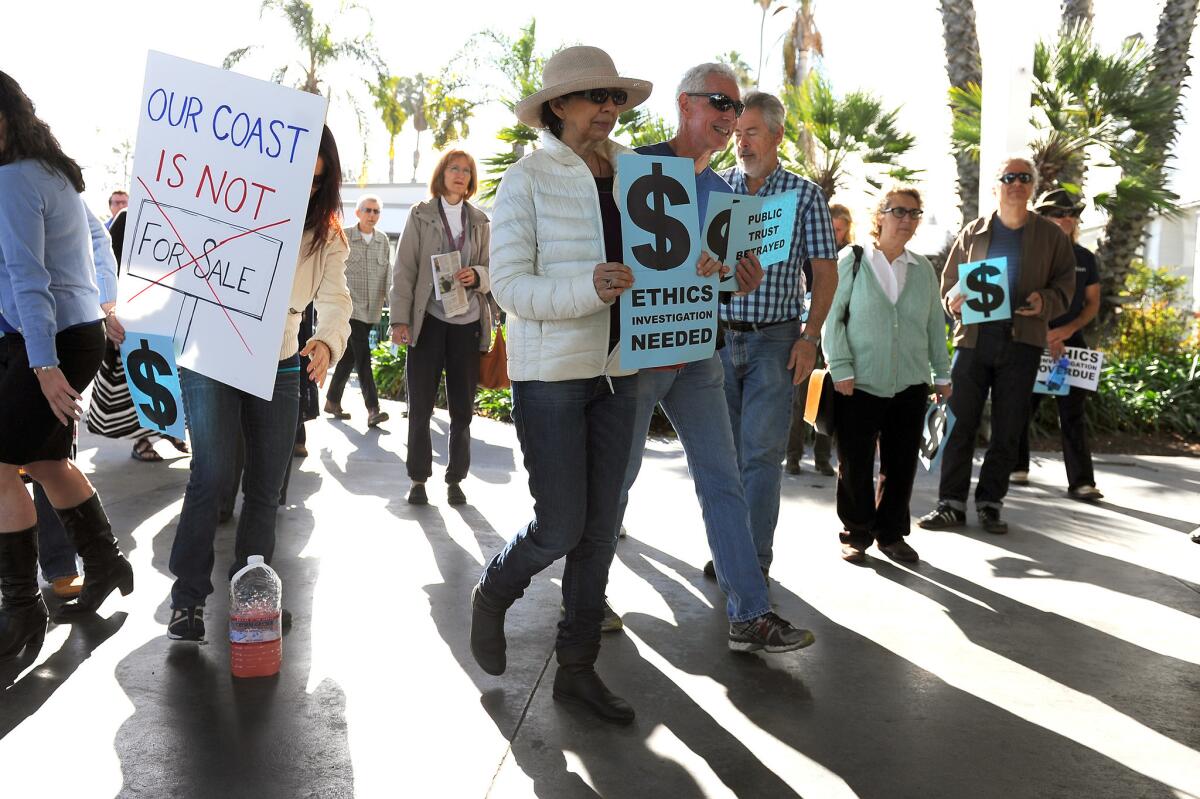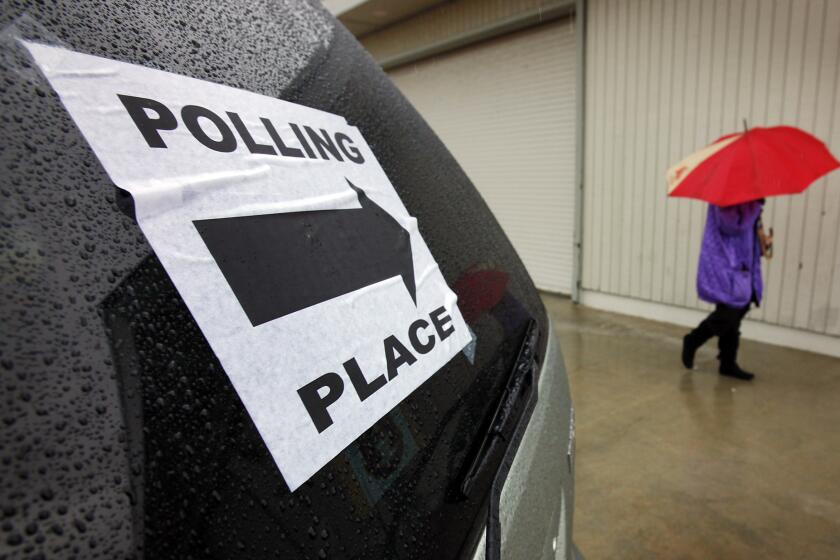Lawmakers act to shine light on California Coastal Commission, other key state boards

Activists rally outside the Santa Monica Civic Auditorium last month before the California Coastal Commission held its first meeting since the firing of Executive Director Charles Lester.
Reporting from Sacramento — Widespread complaints that state commissions operate in the dark and are cozy with businesses had California lawmakers on Wednesday wrestling with a flurry of bills aimed at shedding light on the panels to regain public trust.
More than a dozen pieces of legislation are pending that would change transparency procedures at the California Coastal Commission, the state Public Utilities Commission and the Board of Equalization.
“People naturally distrust government agencies and bureaucracies,” said Sen. Jerry Hill (D-San Mateo), author of six bills. “The Legislature has a responsibility to keep those agencies in check and responsible to the citizens. I think we are seeing the Legislature doing its job.”
An Assembly panel approved a measure on Wednesday that would prohibit private conversations between members of the Coastal Commission and those seeking to lobby them on an issue during the 24 -hour period before the matter will be discussed at a commission hearing.
The bill, which was authored by Assemblyman Mark Stone (D-Scotts Valley) and supported by 24 of his colleagues, would also require those who advocate for issues to a commission member to register as lobbyists and disclose who is paying them.
The measure was introduced after the commission removed former Executive Director Charles Lester during a recent closed-door session. Little public explanation was offered after more than 200 environmental activists and others testified against the ouster.
The bill was supported by Amy Trainer, deputy director of the California Coastal Protection Network, who said there is concern that coastal commissioners have been seen having drinks with lobbyists for businesses the night before a vote.
“I think it’s fair to say that the public trust in this agency is at an all-time low, and that’s unfortunate,” Trainer told the panel. “There is such a lack of transparency right now.”
Stone, a former coastal commissioner, said it appears lobbyists “have their hooks” in some commissioners.
“My intent is to open up and provide transparency in the conversations that are happening between the paid lobbyists and the commissioners themselves,” Stone told the Assembly Elections and Redistricting Committee before it voted, 6-1, to advance the bill.
Later Wednesday, a Senate panel advanced a bill authored by Hill that would prohibit any member of the state Board of Equalization from acting on a tax matter involving someone who has donated money to that member in the previous 12 months. The donations would also have to be disclosed.
The bill was introduced after the Los Angeles Times reported that companies were circumventing a $250 limit on contributions by funneling them through political action committees or by having employees give dozens of checks for $249 each to board members.
“All contributions should be subject to the disclosure and recusal requirement since the Board of Equalization is the only elected tax commission in the nation,” Hill told the state Senate Governance and Finance Committee before it OK’d the bill.
The measure is opposed by Board of Equalization member Jerome Horton, according to his staff attorney, Joss Tillard-Gates.
“It is our belief that restricting even small contributions of $1 to board members, although seemingly innocuous, is unnecessary and most notably a violation of the 1st Amendment right of freedom of expression without a legitimate public interest.”
But Emily Rusch, executive director of California Public Interest Research Group, said a ban is justified. “We think it will improve public trust in the Board of Equalization,” Rusch said.
Hill also won committee approval of a measure requiring the Public Utilities Commission to provide more disclosure of public records, which the senator said have often been shielded from release by a rule allowing utilities broad discretion in declaring documents confidential.
The current rules forced the city of San Bruno to sue to get public records on pipeline maintenance after a Pacific Gas & Electric Co. natural gas pipeline explosion killed eight people in that city in 2010.
“The PUC management’s indifference to the public’s interest has at times bordered on disdain,” Hill told the Senate Energy, Utilities and Communications Committee before it approved the measure.
All of the proposed bills must still pass floor votes in both houses.
Follow @mcgreevy99 on Twitter
ALSO
Brown approval strong in new poll
Clinton leads Sanders in California
Trump leads Republican primary field
More to Read
Get the L.A. Times Politics newsletter
Deeply reported insights into legislation, politics and policy from Sacramento, Washington and beyond. In your inbox three times per week.
You may occasionally receive promotional content from the Los Angeles Times.











